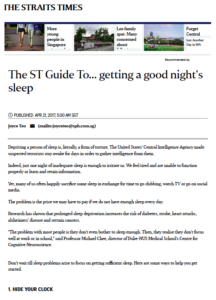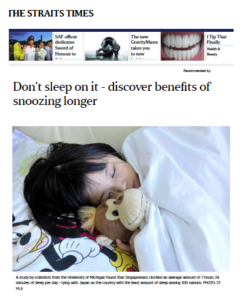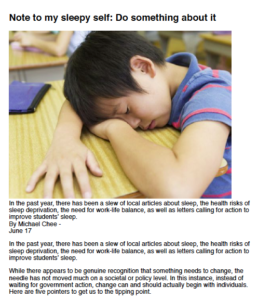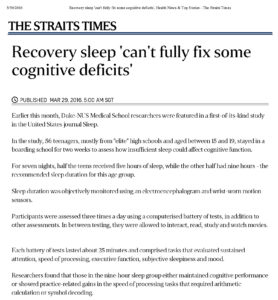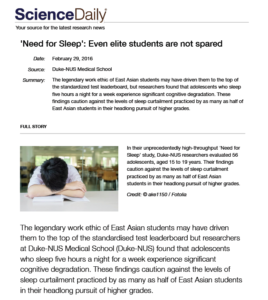Home > News Archive
News Archive
In the News
The move by Nanyang Girls’ High to start school later helps adolescents get appropriate rest, argue Duke-NUS Medical School experts involved in the initiative. SINGAPORE: Channel NewsAsia recently published an article featuring the move by Nanyang Girls’ High School (NYGH) to a later school start time. As the researchers involved in this initiative, we have been following the response to this article on social media with interest. Feedback from the public seems to be largely positive, but there have also been concerns raised about the potential costs of starting school later. Our team is not blind to these challenges and we would like to share why we believe that starting school later is advisable in spite of them.
Read MoreDepriving a person of sleep is, literally, a form of torture. The United States’ Central Intelligence Agency made suspected terrorists stay awake for days in order to gather intelligence from them. Indeed, just one night of inadequate sleep is enough to irritate us. We feel tired and are unable to function properly or learn and retain information. Yet, many of us often happily sacrifice some sleep in exchange for time to go clubbing, watch TV or go on social media.
Read MoreToday is World Sleep Day, an annual celebration of the importance of sleep. While sleep is essential for health and well-being, many people in Singapore are not getting enough of it. Results of a study released by scientists from the University of Michigan last year showed that Singaporeans clocked an average amount of 7 hours 24 minutes of sleep per day – tying with Japan as the country with the least amount of sleep among 100 nations.
Read MoreIn the past year, there has been a slew of local articles about sleep, the health risks of sleep deprivation, the need for work-life balance, as well as letters calling for action to improve students’ sleep. While there appears to be genuine recognition that something needs to change, the needle has not moved much on a societal or policy level. In this instance, instead of waiting for government action, change can and should actually begin with individuals. Here are five pointers to get us to the tipping point.
Read MoreEarlier this month, Duke-NUS Medical School researchers were featured in a first-of-its-kind study in the United States journal Sleep. In the study, 56 teenagers, mostly from “elite” high schools and aged between 15 and 19, stayed in a boarding school for two weeks to assess how insufficient sleep could affect cognitive function. For seven nights, half the teens received five hours of sleep, while the other half had nine hours – the recommended sleep duration for this age group.
Read MoreThe legendary work ethic of East Asian students may have driven them to the top of the standardized test leaderboard, but researchers found that adolescents who sleep five hours a night for a week experience significant cognitive degradation.
Read MoreAnyone who has ever driven home after a red-eye flight or sat through an important but interminable lecture will know the feeling: You’re commanding your brain to stay awake, yet your eyelids feel heavy as lead and they just keep falling shut. Now a team of neuroscientists based in Singapore has documented what’s going on in the brain when the battle to stay awake is momentarily lost. Ju Lynn Ong and her colleagues put 18 healthy participants in a sleepy state by keeping them awake all night in a psych lab. After being awake for 22 straight hours, the participants were asked to lay in the dark inside a brain scanner for two six-minute scans — and to keep their eyes open the whole time.
Read MoreOlder adults who sleep less show evidence of a more rapid decline in cognitive performance, according to a study by Duke-NUS Graduate Medical School Singapore.
Read MoreResearchers at Duke-NUS Graduate Medical School Singapore (Duke-NUS) have found evidence that the less older adults sleep, the faster their brains age. These findings, relevant in the context of Singapore’s rapidly ageing society, pave the way for future work on sleep loss and its contribution to cognitive decline, including dementia.
Read MoreLast year, an opinion-editorial that I wrote on the perils of short sleep received an unexpected flood of attention. Some wrote tongue-in-cheek commentaries on local sleep patterns. A few concerned parents made appeals on forum pages to have morning-session secondary schools start later. Others thanked me for helping them counsel their children. Is this acknowledgement that the effects of sleep on health are being taken more seriously? Perhaps not.
Read More

